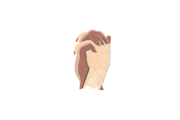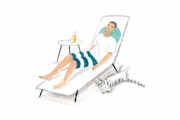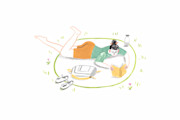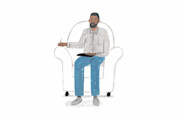Whether you're meeting with a brand new therapist or counselor for the first time or you're completely new to therapy overall, you may be wondering what to bring to therapy.
We created this checklist with items and information to have handy.
If you're seeking a new therapist, the Monarch Directory by SimplePractice makes it easy to find a licensed counselor near you. Many offer online booking and free 15-minute consultations.

Once you have that first therapy session booked, we created this checklist with items and information to have handy, so you know exactly what items to bring to therapy.
14 items to bring to your first therapy session
These are typical questions therapists ask you in an initial session, phone call, or free 15-minute consultation.
This is a starting point to help you feel prepared.
You might find you are asked to provide more information, or it's possible your therapist might postpone these questions for you until after you’ve decided to move forward in working with them.
This is a starting point to help you feel prepared.
1. If you have a health insurance provider, bring your insurance card if you have and wish to use your medical insurance to pay for therapy.
2. A favorite notebook and pen to take notes, and maybe also prepped to include this list of information.
3. A list of good questions to ask your new therapist or potential therapist.
4. Be ready to explain the reasons and concerns that brought you to therapy.
5. Any mental health symptoms you're experiencing. (For instance, sadness, irritability, depression, anxiety, loss of appetite, trouble sleeping, fatigue, trouble concentrating or focusing.)
6. Your medical history, including major illnesses and surgeries you've had as well as current conditions.
7. Information on all current prescriptions (medication name and dosage) you’re taking. Some therapists also want to know about over-the-counter vitamins or supplements you use.
8. Your primary care physician’s name and phone number in case you and your therapist decide it would be helpful to be in contact with your doctor.
9. General information about your self-care routine and wellness habits. Do you exercise? Smoke cigarettes? Get enough sleep? etc.
10. Any family history of mental health issues on both maternal and paternal sides (if you know it).
11. If you've been to therapy in the past, be sure to have handy that therapist’s name along with the dates you saw them.
12. Any history of suicidal thoughts or attempts.
13. Any history of substance abuse
14. What does your support system look like? Do you have friends or family you can talk to about your issues? You may want to have their names and phone numbers on hand.
Some additional tips for success in therapy
Your journey in therapy will be the most effective and successful when you:
Recognize treatment will not fix you—you must fix you.
Recognize that it may not help you feel better right away.
You feel at ease with your therapist and have faith in them.
Have trust in the process.
How to find the best therapist for your needs
The Monarch Directory includes profiles of over 120,000 mental health professionals.
You can view licensed therapists near you and choose to filter them by specialties and types of therapy they practice. Many offer online booking and free 15-minute consultations.

Additionally, you can choose to browse counselors by health insurance provider to find a therapist who accepts your insurance.
READ NEXT: 6 Things to Know Before Your First Therapy Session
Need to find a therapist near you? Check out the Monarch Directory by SimplePractice to find licensed mental health therapists with availability and online booking.


















